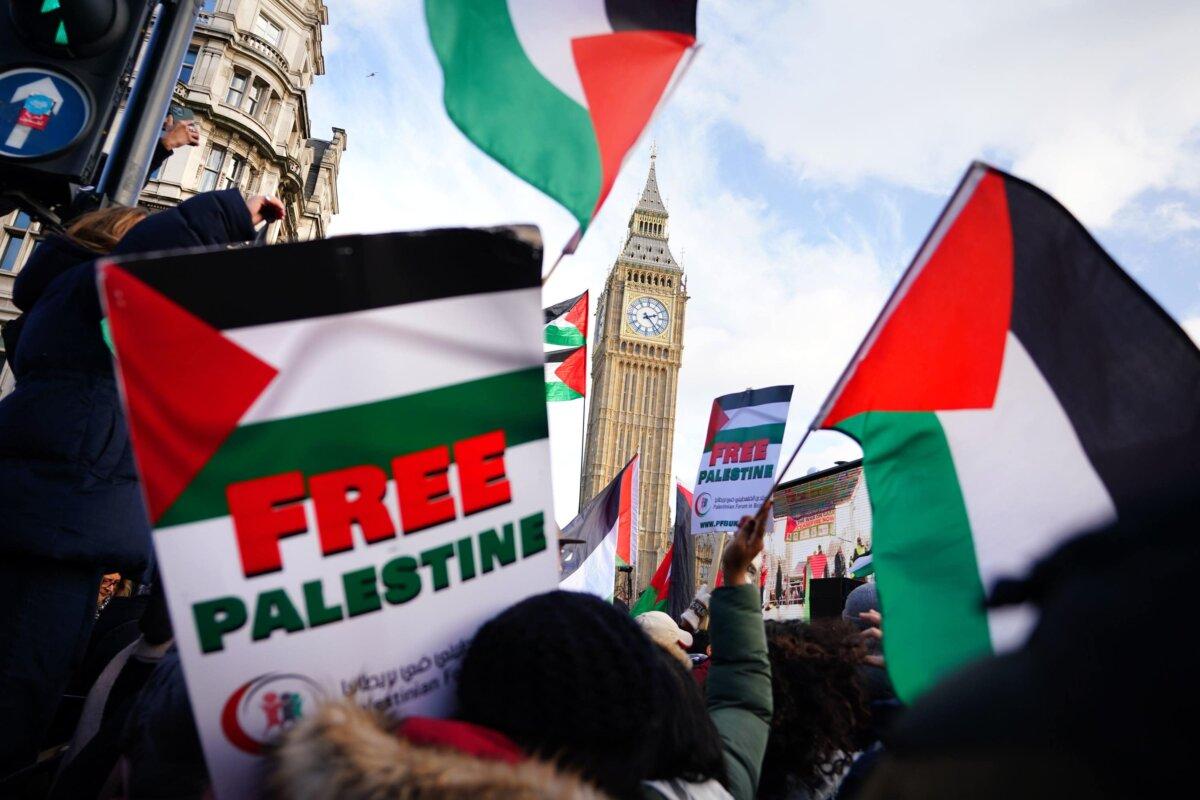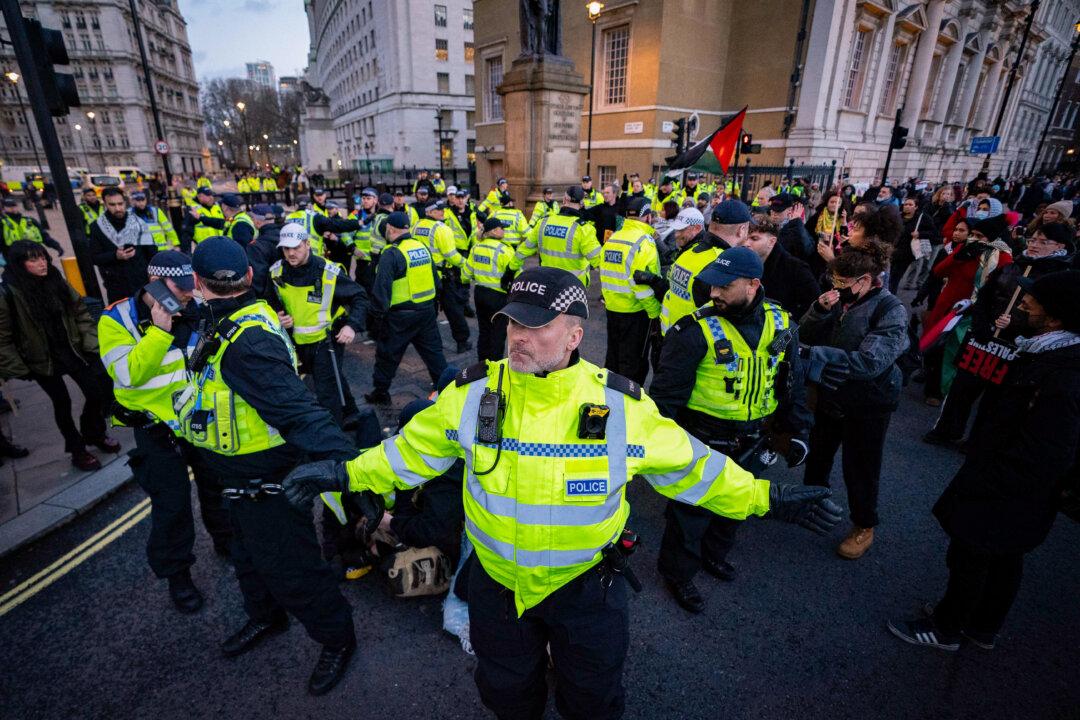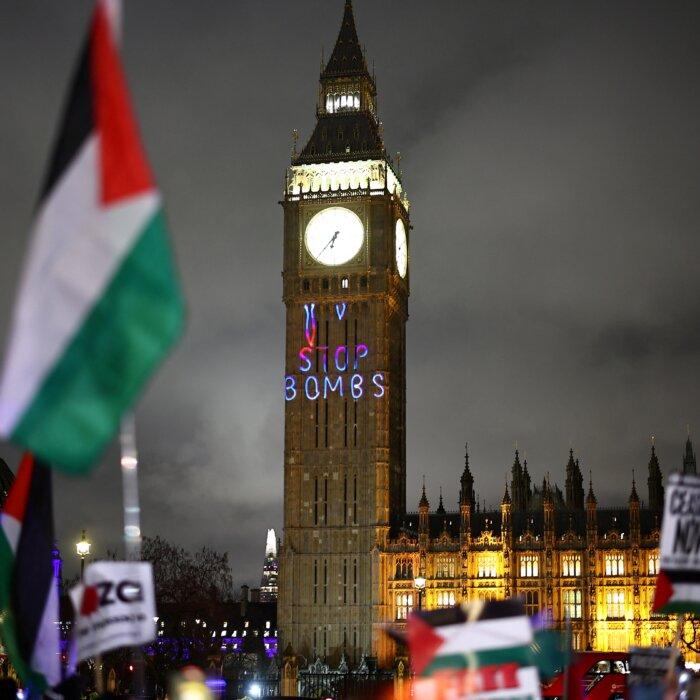The committee repeated its call for a national workforce plan, and suggested that protest organisers could be required to give longer notice to the police.
It also urged the government to publish its response to several reports, including one on legislation to tackle “hateful extremism.”
The committee reported its inquiry into the policing of protests in late 2023 following “a succession of large frequent protests” relating to the ongoing Israel–Hamas war.
Demonstrations related to the conflict began on Oct. 9, 2023, two days after Hamas terrorists attacked Israel and one day after Israel declared war on Hamas.
A coalition of pro-Palestine and anti-war campaigners have since organised marches and demonstrations every week.
As of Dec. 12, 2023, there had been “just over 900 protests to police since the beginning of October and 100 smaller events across the country, ranging from a few hundred people to several thousand,” the committee heard from Chief Constable Chris Haward at the time.
“The repetitive nature of the recent large Israel–Gaza protests places considerable resource constraints on the police,” the committee said.
The HAC said it puts additional pressure on the Metropolitan Police, which was already struggling to meet the regular demands of policing in London.
“The protests further drain police resource with more than 4,000 cancelled rest-days, and the same police officers being deployed week in, week out,” the report said.
Matt Twist, assistant commissioner for Met Operations, told the committee that the cost of policing Israel–Hamas war related events had cost an estimated £18.9 million by Dec. 17, with 26,121 officer shifts used, including 2,382 shifts from officers from other forces, and 4,017 cancelled rest days.
Mr. Twist told a Policy Exchange event last month that the estimated cost had risen to around £26.5 million.

Longer Notice Periods
Under current rules, organisers of marches have to notify the police at least six days in advance, and there’s no need to notify the police for static demonstrations.The HAC suggested that requiring longer notices may help police to prepare better.
“Should these protests continue week after week, the Home Office should consider amending requirements for protest organisers, such as increasing the notice period for protest organisers to inform the police from the current six days, to allow the police to prepare better,” the report said.
The committee also repeated its previous call to replace workforce plans designed by individual police forces with nationwide strategic planning.
The HAC also said it’s “deeply troubled” by the rise in so-called “hate crime” since the war broke out.
There has been little physical violence in the successive pro-Palestine marches, but protesters have been arrested over chants and signs that are deemed to be anti-Semitic or glorifying a terrorist group.
According to Mr. Haward, the figures for “anti-Semitic crime” and “Islamophobic crime” were up by 680 percent and 140 percent year on year, respectively.
There is no standalone “hate crime” in England’s statute book. The police record any criminal offence which is perceived to be motivated by hostility or prejudice based on a person’s actual or perceived race, religion, sexual orientation, disability, or sexuality as a hate crime. Once a defendant is convicted of a crime, the Crown Prosecution Service can ask the court to increase the sentence if the crime has been flagged as a “hate crime.”
The committee heard in December that the stewards in the large pro-Palestine marches had been “good” and “helpful,” but they had not directly reported suspicion of any so-called hate crimes within the marches.
Donna Jones, chair of the Association of Police and Crime Commissioners, and police and crime commissioner for Hampshire and the Isle of Wight, said: “The response to large-scale protests places significant strain on policing resources, piling extra pressure on forces and their ability to deal with the other risks facing their communities. It also has wider consequences on officer welfare and well-being with rest days cancelled.
“We welcome the committee’s calls for police forces to be given greater support to manage such events and prevent disorder and for potential new rules requiring organisers to give more notice to enable them to better prepare and develop contingency plans.
“There is always a balance to be struck between the right to peaceful protest and the right of the public to go about their lives safely and without fear. As [police and crime commissioners], we would welcome a national workforce plan setting out how forces should respond to the acute demands posed by protests while ensuring resources are not diverted away from local communities that have their own crime challenges.”
A spokesperson for the Campaign Against Antisemitism said the report “disappointingly” fails to address “the increasingly urgent need to restore the confidence of the British public and ensure the safety of this country’s Jewish community.”
The statement said increasing the notice period “would not change the actual nature of these marches and therefore solves nothing other than timesheet planning for our overstretched police forces.”
“After months of intimidatory marches, this report offers no concrete recommendations for the here and now, just a long-term policy discussion about workforce planning and new laws that will take years to agree. Millions of pounds are being diverted from fighting crime into policing these relentless marches. The Jewish community is in fear and our city centres remain no-go zones during the protests. We need action urgently,” the spokesperson added.







